
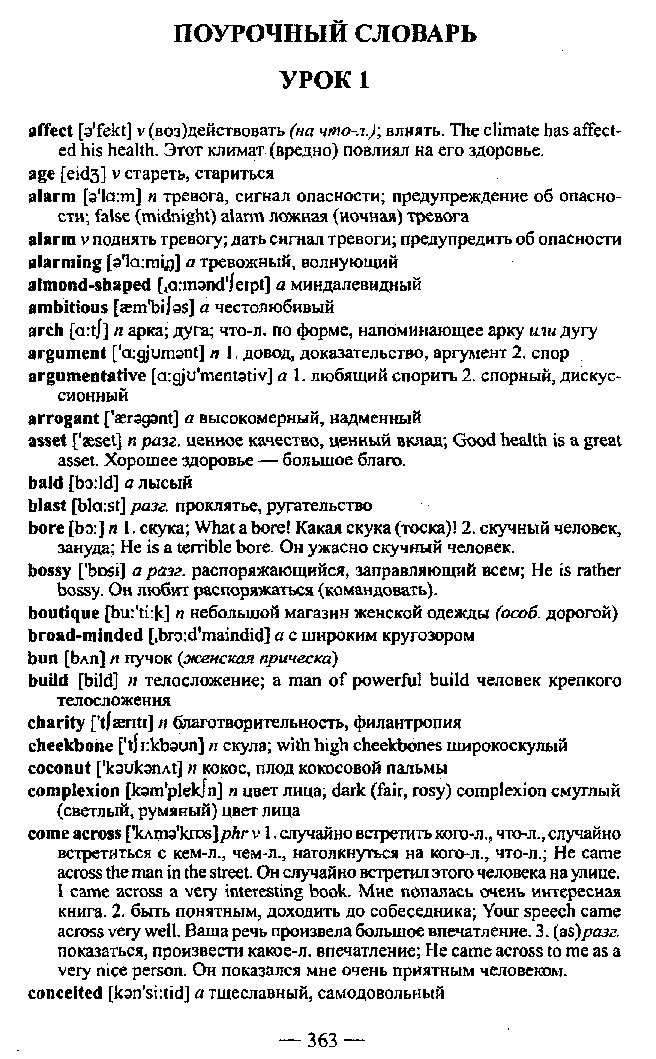
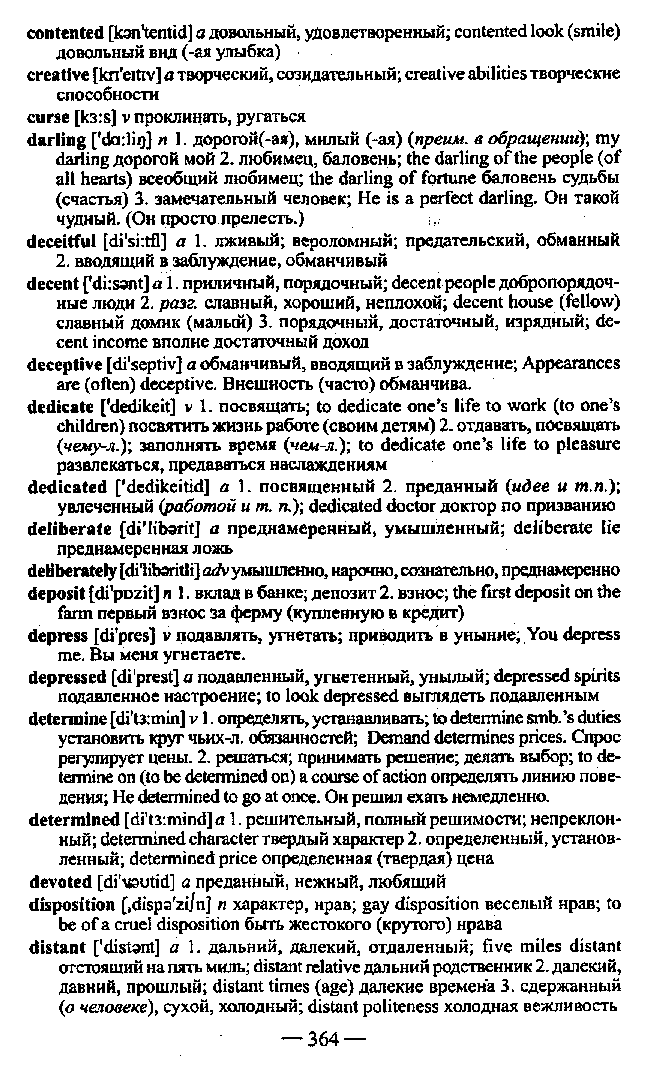
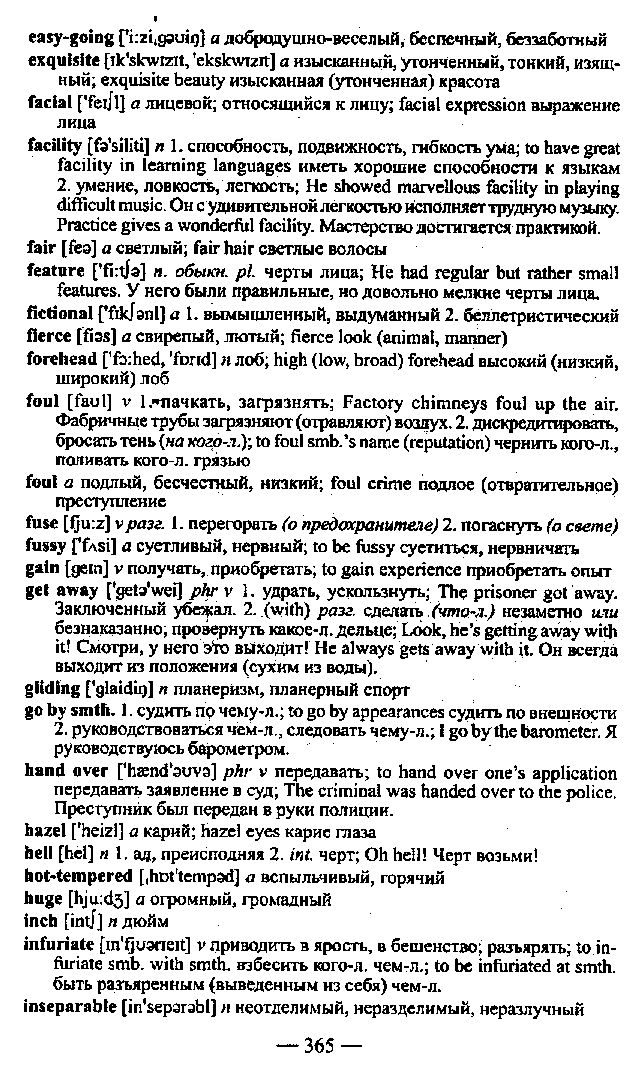
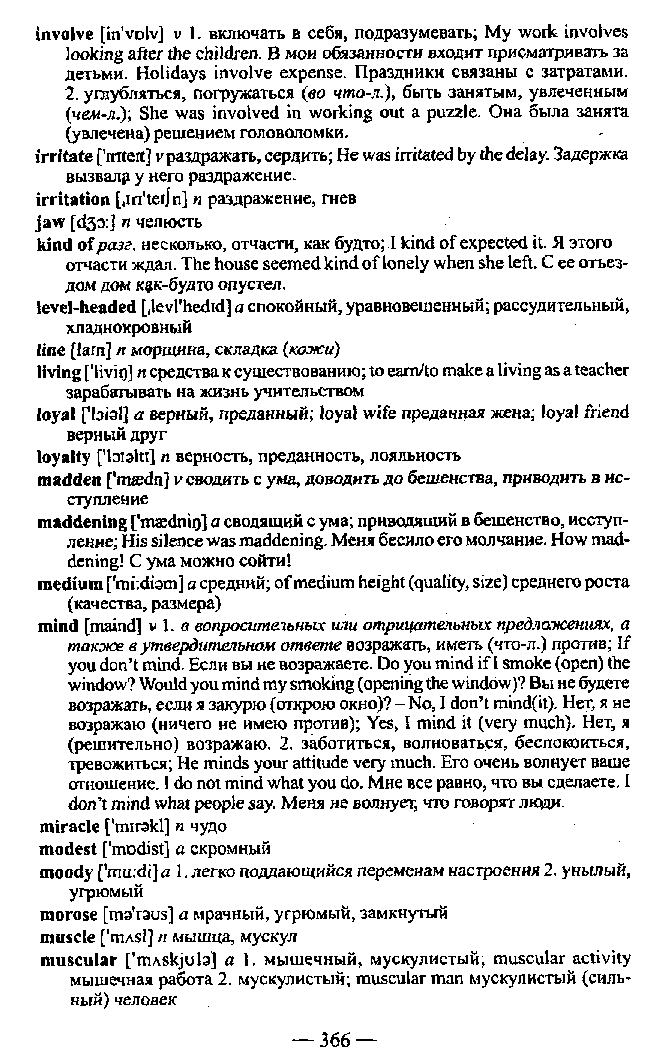
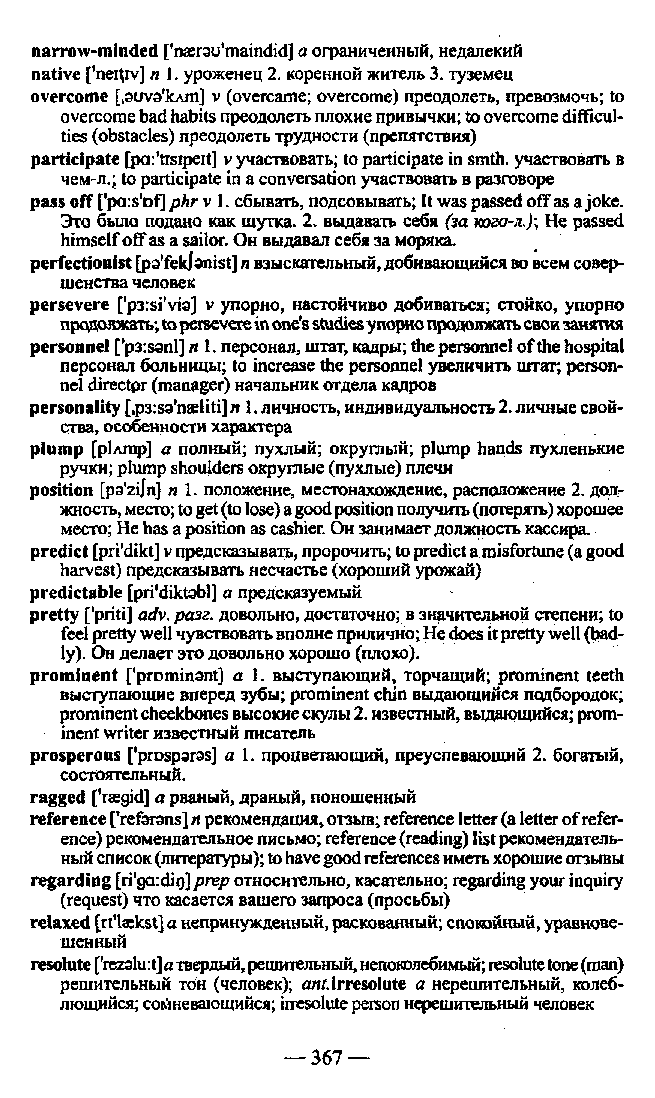
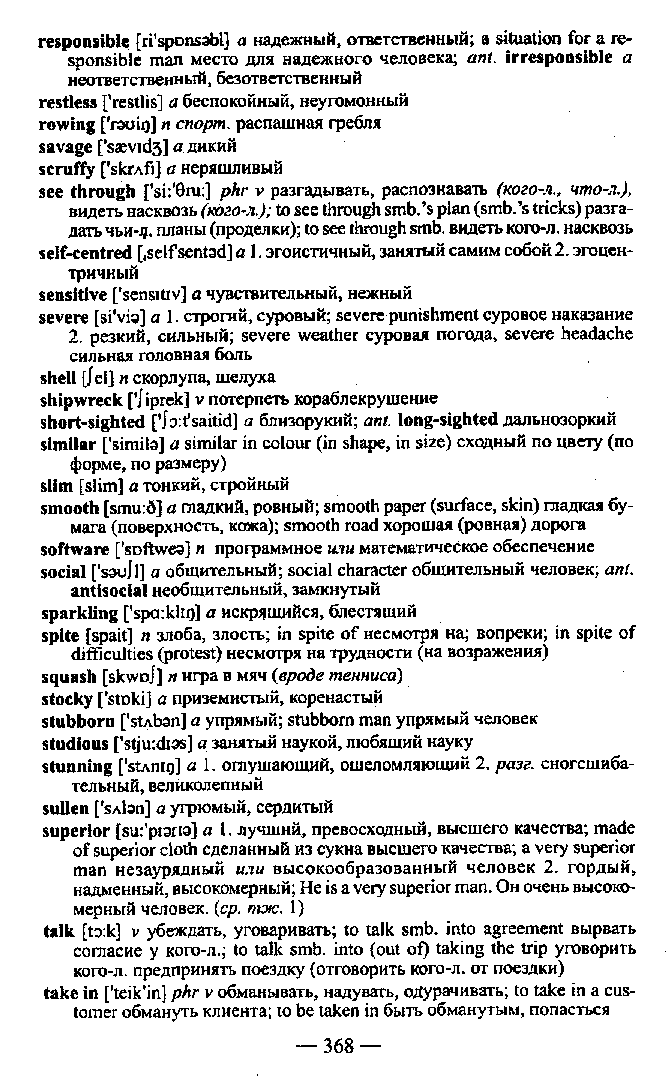
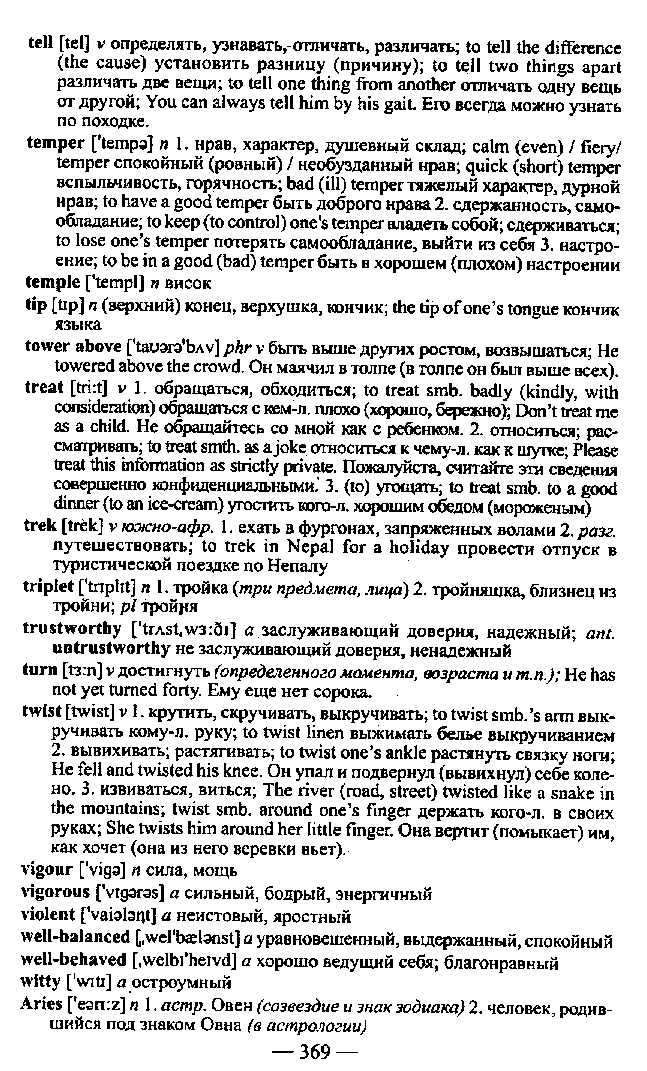
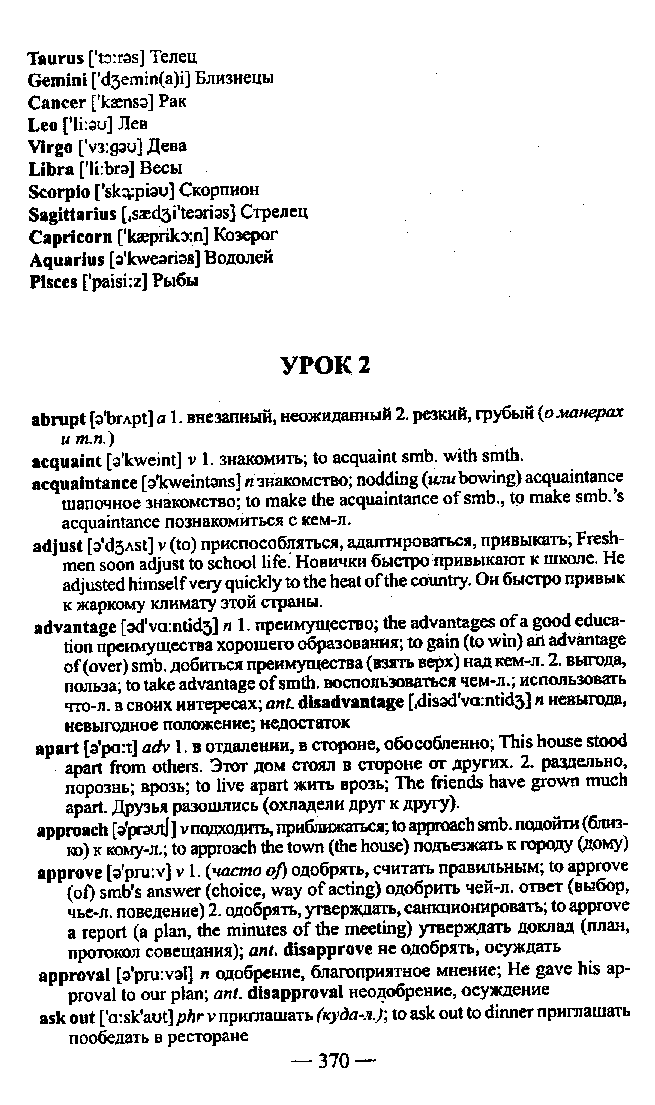
UNIT 1
Practice
COMMUNICATION: FEELINGS AND EMOTIONS
Annoyance
What do you say when something annoys you ( irritates you)? Here are some of the ways in which you might respond.
A
We've missed
the train, the boat, the plane.
Somebody has
hit your car. stolen your bicycle, taken your coat.
You're too late. The (film / play / programme / show) has
already started.
The last train has just left.
The shops are all closed today.
I'm sorry, we're sold out./ There are no tickets left.
B
(Oh)...
No!
How annoying! How very annoying! Isn't that annoying! How infuriating! Isn't that infuriating! How maddening! Isn't that maddening! What a nuisance! What a bore! Hell!
colloquial
Damn! Blast!
/. Respond expressing annoyance.
What might you say if:
you lost your car keys?
you burned the dinner?
your electric lights fused?
your boyfriend / girlfriend was late?
you locked yourself out of your flat or house?
> A: I've lost my car keys. B: How very annoying!
2. Learn the dialogue and make substitutions.
A: Flight BE 407 to Rome is delayed. Will passengers please wait in the lounge.
B: Oh, how annoying!
A: The time of departure will be announced as soon as possible. B: It's infuriating! I had to be in Rome by five.
Paris Oh no!
Madrid How irritating!
Prague Isn 't that maddening!
Lisbon What a bore!
Athens What a nuisance!
Bonn Damn!
Istanbul Just my luck! (can also be used to express annoy- ance)
3. Tell someone something annoying, for example: You've got ink all over your jeans.' He or she will respond by using an expression of annoyance.
— 4 —
ary.' 'I hope we'll do, Jacob is so keen on skiing.' 3. 'Where's Val?' 'I am not certain. I think he (play) squash. Let's go and see if 1 am right.'
'Where's Val?' 'I have heard something about his love for plants and flowers. So he (go) already to the Botanic Gardens without waiting for us.' 5. Take your camera. There you (come across) something worth remembering. 6. 'Why is he so impatient about returning home as soon as possible?' 'He (hear) from his family and (learn) something that makes him return in a hurry.' 7. Don't turn off the light; Father (come back) after dark. 8.'Why are you whispering all this when you can say it all aloud: we are alone.' 'One never knows who (listen) too.' 9. 'Where do you suppose he is now?' 'He (be) in New York.' 10. 'Molly, do you know where Mum (put) her address book?' 'No, though I think it (lie) still in the hall' 11. I'm afraid it (not, stop) raining by the morning. 12. If they don't miss the train, they (arrive) in time. 13. 'Why isn't he here yet? What has happened?' 'Oh, he (miss) the train.' 14. 'What do you think he was doing there?' 'He (wait) for somebody' 15. 'Perhaps they didn't address the letter correctly.' 'Yes, it (not, address) correctly.'
Translate into English.
Может быть, они знают друг друга, но я не уверен в этом.
Возможно, они все еще спорят, принять или отвергнуть его предложение. 3. Может быть, мы поедем в Крым этим летом. 4. Возможно, мой брат забыл позвонить вам. 5. Может быть, дети играют у реки. 6. Ему, возможно, уже вручили диплом. 7. Они, возможно, работали в саду, когда я позвонил, так как никто не подошел к телефону. 8. Возможно, он не заметил нашего отсутствия. 9. Может быть, она не ожидала встретить вас на вечере. 10. Может быть, он заболел и поэтому не пришел. 11. Я думаю, что это может случиться очень скоро. 12. Он сказал, что он, возможно, вернется в мае. 13. Возможно, я получу скоро работу. 14. Она может поехать в Лондон следующим летом. 15. Не уходи из дома. Возможно, он позвонит. 16. Возможно, она не придет. 17. Хорошая новость! Мне, возможно, скоро предложат работу. 18. Ее не было на вечере. Возможно, ее не пригласили. 19. "Почему его нет?" "Возможно, он не знает как добраться сюда."
TOPIC: APPEARANCE. CHARACTER
Listen, read and practise. Speak about your friends and relatives.
The Characters
Celia is nineteen. She is the only daughter of Robert and Gladys Thompson. She is a slim and attractive girl. She has long fair hair, which she brashes vigorously every night before going to bed. She likes meeting people, reading and being independent. She has a keen sense of humour and enjoys life very much.
Gladys is Celia's mother. She is in her middle forties. When she was Celia's age she married a man called Thompson and she has disagreed with him in most things ever since. Secretly, however, she is devoted to him. Secretly, too, she thinks she looks almost as young as her daughter, and with her greater experience —.
Robert is ten years older than Gladys. He works for an insurance company. The company office is near the road where he lives. When he was a boy at school he was a very promising athlete. He was particularly good at rowing and golf. Now he takes very little exercise and, as a result of this, is putting on weight. His hobbies are gardening, watching television and disagreeing with Gladys.
Adrian at twenty-four already has a good job in London with a firm of solicitors. The directors of the firm think highly of him. He is six feet tall and dark haired and he always looks well-dressed and prosperous. His parents, who were killed in a car accident, left him a small house in Cambridge, which he visits at the weekends. He is passionately interested in sport, especially tennis, which he watches every year at Wimbledon. He is also interested in becoming Robert Thompson's son-in-law. Cliff is lazy, good-looking, intelligent and usually rather scruffy. He doesn't always shave in the morning, and in Robert Thompson's opinion always needs a haircut. Sometimes Cliff thinks he will become a pop-star; at other times, a lecturer in sociology. But he finds doing nothing very enjoyable.
Joseph is Cliff's landlord, among other things, but no one knows exactly what he does. He has one or two strange habits and this makes him a bit of a mystery man.
'Stephanie runs a small boutique in London. She knows about the' latest fashions in clothes. She attends Ascot and Henley and other fash-
— 9 —
ionable events. She's lucky, because she likes travelling and her work often takes her abroad. The astrologist she once consulted told her that she would marry a tall, dark man.
Sebastian is a foreign student who has come to England to improve his English. He is friendly and intelligent, and very enthusiastic about his studies. Unfortunately, every time he speaks he seems to make a bad mistake, and there is a chorus of 'No! No! No!' from his English friends, all of whom want him to learn good English. Sometimes he gets depressed. He does not think he is making enough progress. 'But you are,' his friends say. 'You must persevere!' 'Persevere?' Sebastian says, 'What means persevere?' 'No! No! No!' they cry. 'You must say: "what does persevere mean?" 'Zut!' Sebastian says.
A. Ask and answer questions about the characters described in the text.
B. Practice.
1. Fill in the gaps with the words lucky or happy. 1. Mrs Brown is... as her son is doing well at school. 2. Dickens' novels have a... end as a rule. 3. It is rather difficult to get tickets for the evening show. If you are..., ring me up! 4. How... we are! The weather is splendid for the picnic. 5. They were... in married life. 6. She was... to see him again. 7. I was not... . When I reached the station, the 5 o'clock train had already left. 8. You are... .1 can see it in your eyes. 9. Though he was... in business, he was far from... at home!
Expressions with 'Do'
one's best/worst, business with smb, a crossword, damage to, one's duty, an exercise, an experiment, good, one's hair, harm, homework, housework, a job, lessons, smth for a living, miracles (for), research, right/ wrong, a service, the shopping, a translation, the washing-up, work etc
Expressions with 'Make'
an appointment, an arrangement, the beds, a cake, certain, changes, coffee, a deal with smb, a decision, a discovery, an effort, an excuse, a fortune, an impression, improvements, a joke, a mess, a mistake, money, a noise, an offer, peace, preparations, progress, a success of smth, sure, a translation, trouble, war etc
— 10 —
2. Fill in make or do in the correct form.
1. After she ... the washing-up she went out ... the shopping. 2. Although I... my best, I'm afraid I... several mistakes. 3. When you ... your homework, could you please ... the beds? 4. You have to ... a decision soon. 5. A few days in the country would ... me good. 6. You will ... more progress if you ... the exercises carefully. 7. John ... a fortune on the Stock Exchange. 8. Those children ... so much noise! 9. Soldiers must always ... their duty. 10. She ... such good work that she always ... a good impression. 11. To see the dentist, you'll have to ... an appointment. 12. They've decided to... some improvements before moving into the office. 13. After I ... my Maths homework, I had my mother ... sure it was all right. 14. She is used to ... business with foreigners. 15. She ... some research when she ... the discovery. 16. To ... a success of this business we will have to ... some changes. 17. Would you ... an effort to ... this translation by next week? 18. She ... her excuses for not attending the meeting. 19. Someone ... an offer for the house. 20. Eating too many sweets can ... harm to your health. 21. He ... a very strange remark. 22.1 recommend you to promise little and ... much. 23. ... as you are told. 24. Pete ... no answer. 25. We had been there about three months, and my mother ... friends with some people called Blacksmith. 26.1 beg you to ... nothing of the kind. 27. What... you come here? 28.1 have an announcement to ... .29. Will you please ... the room? 30.1... a report at the meeting. 31. He ... his mind to sell the house. 32. She ... her living by ... translations. 33. Will you ... me a favour? 34. If you don't... an effort, you won't... any progress.
3. Fill in the blanks as in the example. Retell the texts.
A. Three of my best (good) friends — Catherine, Beatrice and Anne — are triplets, although if you met them, you would not even think they were related. Beatrice, who is ... (old) looks nothing ... her sisters. She is... (tall)... both Anne and Catherine and slightly ... (thin). Her hair is ... black ... coal whereas her sisters have much ... (light) hair. They also have very different personalities. Catherine is probably ... (loud) ... the three and ... (funny). Anne and Beatrice are ... (quiet) and ... (sensitive) ... their sister, but they are all equally friendly. I think they are ... (nice) triplets ... the world.
B. Two weeks ago, I went into town to buy a birthday present for my eldest (old) sister. You couldn't meet а ... (wonderful) person ... her. She is one of... (charming) and ... (funny) women I know. She is also
— 11 —
... (generous) -hearted person I've ever met. ... (bad) thing is that she has a ... (quick) temper than me. Mother says she could also be a bit... (tidy) ... she is. Anyway, the present I wanted to buy her had to be ... (good) I could afford. Eventually, I came across ... (beautiful) scarf I had ever seen. It was ... (long)... the one she already had and much ... (colourful). Imagine my disappointment when I discovered the next day that Mother had bought her exactly the same scarf.
4. Translate into English.
1. Мой брат очень способный к иностранным языкам. 2. Он очень предан своей семье. 3. У моего отца хорошее чувство юмора. 4. Он выглядит неряшливо. 5. Моя мать руководит небольшим книжным магазином. 6. Ты интересуешься фигурным катанием? 7. Я поправляюсь. Я должна сесть на диету. 8. Она очень волнуется по поводу предстоящих экзаменов. 9. Мой сын хорошо успевает в школе, и учителя о нем высокого мнения. 10. Мой брат работает в страховой компании. 11. В молодости он был многообещающим футболистом. 12. Я хочу сделать торт. Мне нужна сметана. — Тебе нужны яйца? — Нет. 13. Мой брат преподаватель. Он читает лекции по истории. 14. Я очень устала, когда работала в саду. 15. Моя сестра высокая стройная девушка с голубыми глазами и светлыми волосами. 16. Ему пятьдесят с небольшим. 17. Он очень хорошо рисует. 18. Ему нравится рыбалка. 19. Я не знаю точно, где он работает. 20. Фильм был несколько скучноват. 21. Я хочу, чтобы ты помог мне починить телевизор. — Я (нахожусь) здесь, чтобы помочь тебе сделать это. 22. Кажется, она ему нравится. 23. Он думает, что не сможет справиться с этой работой. 24. Она такая же красивая, как и ее мать. 25. Днепр не такой длинный, как Волга. 26. Это были самые счастливые дни в ее жизни. 27. Это очень легкая задача. Дайте мне более трудную задачу. 28. Китай больше Индии. 29. Какая из этих книг самая интересная? 30. Сегодня он чувствует себя гораздо лучше. 31. Моя комната не такая большая, как комната моей подруги, но она светлее и теплее. 32. Этот фильм гораздо интереснее того, который мы смотрели вчера. 33. Неужели я выгляжу такой же полной, как та женщина? Это ужасно. 34. Самые высокие деревья растут в Калифорнии. 35. Моя сестра говорит по-английски гораздо хуже, чем я.
My Aunt Emily
Of all my relatives, I like my Aunt Emily the best. She's my mother's youngest sister. She has never married, and she lives alone in a small
village near Bath. She's in her late fifties, but she's still quite young in spirit. She has a fair complexion, thick brown hair which she wears in a bun, and dark brown eyes. She has a kind face, and when you meet her, the first thing you notice is her lovely, warm smile. Her face is a little wrinkled now, but I think she is still rather attractive. She is the sort of person you can always go to if you have a problem.
She likes reading and gardening, and she goes for long walks over the hills with her dog, Buster. She's a very active person. Either she's making something, or mending something, or doing something to help others. She does the shopping for some of the old people in the village. She's extremely generous, but not very tolerant with people who don't agree with her. I hope that I am as happy and contented as she is when I'm her age.
A. Questions.
1. Which of her relatives does the writer like the best? 2. Where does Aunt Emily live? 3. How old is she? 4. What does she look like? 5. What is her character like? 6. What does she like to do?
B. She's 'not very tolerant'. This is a nice way of saying she is 'intoler ant'. Sometimes we try to be polite by not using a negative adjec- tive. We can say not very + the opposite adjective.
Use a tactful way to describe someone who is:
a. rude с mean e. cruel
b. boring d. ugly f. stupid
C. Who is 'you' in the sentences 'She has a kind face, and when you meet her, the first thing you notice is her lovely, warm smile.'' She is the sort of person you can always go to if you have a problem.'
D. Write a similar description of a member of your family in about 200 words. Include the following:
your opinion of the person
physical description
their character, habits, likes and dislikes.
My Uncle Martin
My uncle Martin is my mother's elder brother. He is my favourite among my mother's family. He is a very interesting man. He lives quite near us with my aunt Angela and my cousins, Anne and Bob. I often go to his house.
— 12 —
— 13
He is about 45 and grey-haired. He is still quite good-looking, tall and well-built. He has blue eyes and a strong face. He is short-sighted, so he wears glasses. He takes them off when he is not working.
Uncle Martin is a textile engineer. He works for a big firm in the City. He travels widely in his job. He is an expert in solving problems with machines. At present, he is in the United States. He is visiting the firm's customers there.
Uncle Martin is very fond of the sea. He has a boat at the seaside. He goes there every weekend in summer to sail it. I sometimes stay with my cousins at their house on the coast. When Uncle Martin is at home, he usually takes us out in the boat.
I always enjoy talking to Uncle Martin. He has a good sense of humour and makes me laugh. He does not talk about his work. He knows a lot about the world. He tells stories about his experiences. In general, he is broad-minded and tolerant. He has one fault. He is extremely tidy. He gets angry when other people move any of his things. My aunt and cousins never touch them. He loses his temper.
A. Ask and answer questions about Uncle Martin.
B. Change each sentence to include a compound adjective.
He wore a shirt which had been made by hand. / He wore a hand-made shirt.
The sun had tanned her skin. /She had ....
The man had long hair. / He was a ... .
The man's hair was red. / He was а ... .
He had long hair reaching to his shoulders. / He had ....
The man dressed well. / The man was ....
She had dark hair and blue eyes. She was а ... .
The man had broad shoulders and a black beard. He was а ... .
C. Speak about one of your relatives.
My Sister Janet
Janet, my elder sister, is 21. She does not look like me because she has blue eyes and fair hair, while my eyes are brown and I am dark-haired. She has a lovely fresh complexion and a beautiful mouth, with full lips, but she is short-sighted, so she wears contact lenses. She is quite tall and has a beautiful, slim figure. She is very smart and looks really attractive when she dresses up to go out with her boyfriend.
— 14 —
Janet is studying languages at the university and in summer she works for a travel agency. She can speak French and Spanish and now she is learning modern Greek. She always goes abroad for her holidays. Janet loves being with a crowd of people and when she goes abroad she talks to the local people and makes friends easily. She loves going to parties and eating out. She is good at games but never takes them seriously so when we play tennis I always win because she doesn't care if she wins or loses.
Janet is very witty and amusing and she always cheers me up when I am depressed because she has a wonderful sense of humour. I think her only fault is that she is restless and easily gets bored. She is an intelligent, hard-working person but she doesn't get good marks at university because she doesn't study enough. I admire her because she is so bright and energetic but I think it is a good thing that her boyfriend is a calm, tolerant man and when she is impatient with him, he just laughs and then she laughs, too.
A. Ask and answer questions about Janet.
B. Practice.
1. Group the words from the list according to the word-building suffixes:
charming, generous, kind-hearted, lovely, boring, active, courageous, reserved, greedy, studious, angry, talkative, funny, hard-working, sensitive, gifted.
2. State the meaning of the suffixes -fill-, -less and the prefixes un-, im-, ir-, in-, il- by translating the following pairs of words.
thoughtful — thoughtless kind — unkind
truthful — truthless patient — impatient
careful — careless responsible — irresponsible
helpful — helpless sincere — insincere
meaningful — meaningless tolerant — intolerant
hopeful — hopeless logical — illogical
3. Form the corresponding nouns.
polite— politeness modest:— modesty
weak — honest —
shy — generous —
kind — active —
frank — cruel —
rude — stupid —
— 15 —
- courage
|
important - |
— importance |
courageous |
|
tolerant — |
|
friendly — |
|
different — |
|
famous — |
|
elegant — |
|
gifted — |
|
violent — |
|
snobbish — |
My Friend Jane
Jane, an old friend of mine, has the kind of personality people describe as 'sunny'. She is amusing, intelligent, and lively. She is very good-looking, too; quite tall, with long, reddish-brown hair and attractive brown eyes.
Jane is very active and always seems to be doing something. She is a computer programmer and works for a big software company in Wales. She is married, with five-year-old twins, but she somehow finds time to paint, knit beautiful sweaters for the family, play the piano, and ride her horse, Misha. She does not like cooking much and she hates housework. Her only fault is that perhaps she is a little untidy.
Jane seems to have everything, but I know there is one thing she would secretly like to do. She loves walking in the mountains, away from her daily worries, and one day she would like to go on a trekking holiday to the Himalayas to see Mount Everest. I hope her wish comes true.
A. Questions.
1. What is Jane like? 2. What does she do? 3. Is she married? 4. Has she any children? 5. What does she do in her free time? 5. What secret wish does she have?
B. Translate the adjectives with the suffix — ish.
N + ish = like A + ish = quite, fairly
foolish (person) reddish (hair)
snobbish (person) longish (hair)
childish (behaviour) biggish (crowd)
girlish (laugh) tallish (person)
selfish (person) bluish (colour)
boyish (figure) coldish (weather)
About My Relatives and Myself
My brother is 22 years old. He is of medium height and build, a bit stocky, but strong with it. He has long, curly fair hair. It is fashionable at the moment for men to grow their hair. His hair nearly reaches his shoulders. My mother is always telling him to get it cut. He doesn't take much care over his appearance so he often looks quite scruffy. He hates having to wear a tie for work. When he's at home he wears comfortable clothes such as T-shirts and jeans. He doesn't care very much what he looks like.
My other brother is much taller — he towers above me, even though he is only 15. He does quite a lot of sport so he's quite strong and has well-developed muscles. He has straight brown hair, bluish grey eyes and a little nose.
He is clever and quiet and spends a lot of time at his computer. People sometimes think that he is morose and sullen but I don't think that's the case — he just prefers to think rather than to talk.
My mother turned 50 this year, although she doesn't look it. She has aged quite well I think. Only now is she beginning to show signs of old age — her hair has started to go grey and her skin is drier. She is also thinner — she used to have a tendency to put on weight. She is quite tall — it's a characteristic of her side of the family. She is usually well-dressed. She is the sort of person who always looks quite smart — I'm the exact opposite — it doesn't matter how much time, money and energy I devote to my appearance, I usually look scruffy.
My father is quite short and a bit plump. I take after my father's side of the family. My father is nearly bald and the hair that remains is grey. He wears sensible, practical clothes most of the time, but for work he has to look smarter so he wears a suit and a tie and looks every inch a teacher. My father is not a pleasant man. He gets angry and loses his temper quite often.
A. Ask and answer questions about the people described in the text.
B. Practice.
1. Read and translate these sentences.
1. She turned red when she heard the news. 2. The trees in your garden have grown quite tall. 3. How did they get acquainted? 4. She became suspicious. 5. Everything will come right in the end. 6. She went pale at
— 16
— 17 —
the news. 6. He's going bald. 7. The well has ran dry. 8. The stone steps have worn smooth. 9. He went mad. 11. The post of headmaster fell vacant.
2. Change each sentence to include a compound adjective.
My uncle has a hot temper. / He is a hot-tempered man.
My grandmother had a kind /open/ frank heart. She was a ... .
My father-in-law has a bad /quick/ hot temper. He is a ....
He has good /ill/ bad manners. He is a ... .
He had a broad /narrow/ progressive mind. He was a ... .
She had a strong / weak will. She was a ... .
3. Form compound adjectives beginning with well- good-, kind-, self-, strong- open- hot-.
behaved balanced educated built well bred
brought up paid known informed
4. Give the opposite of the adjectives below.
responsible —
resolute —
hard-working —
quiet —
cruel —
strong —
scruffy —
broad-minded:—
strong-willed —
good-mannered —
good-natured —
careful — careless
helpful —
cheerful —
lucky —
fair.—
friendly —
sincere —
8.tolerant —
9. capable —
patient —
polite —
Which is ^out Sta£ Sign?
Aries (21/3 — 20/4): energetic, bossy, often bad-tempered, warm, generous, sensitive, artistic.
Taurus (21/4 — 21/5): hard-working, calm, friendly. Interested in business, money, friends and family.
Gemini (22/5 — 21/6): clever, witty, very talkative, changeable. Interested in books, people and ideas.
Cancer (22/6 — 23/7): humorous, conservative, often happy, anxious, shy. Interested in history.
Leo (24/7 — 23/8): proud, bossy, independent; either very tidy or very untidy; passionate and generous.
Virgo (24/8 — 23/9): practical, punctual, critical, hard-working, perfectionist. Interested in nature.
Libra (24/9 — 23/10): friendly, energetic (but also lazy), pleasant, argumentative. Interested in sport, animals.
Scorpio (24/10 — 22/11): brave, sometimes violent, extremist, possessive, passionate. Often very religious.
Sagittarius (23/11—21/12): talkative, self-confident, cheerful. Interested in sport, travel, living dangerously.
Capricorn (22/12 — 20/1): conservative, polite, serious, sociable but shy. Interested in home, politics, people.
Aquarius (21/1 — 19/2): tolerant, sociable but unstable. Interested in sport and politics. Often brilliant or mad.
Pisces (20/2 — 20/3): sensitive, emotional, imaginative, artistic, depressive. Very interested in themselves.
A. Read about your personality in the text. Is it true? Write a few sentences about yourself Example:
It is true that I am energetic, but I do not think that Г am bossy, and I do not agree that I am often bad-tempered. I look calm, but actually I am rather nervy. I think I look like a businessman...
— 18 —
19 —
В. Practice.
1. Read the text carefully and choose which word or phrase is best. What do you think? Have you any proof that horoscopes actually work?
Do you believe in horoscopes? I'm sure that I don't believe in them for a number of reasons. As well as this/First of all, I don't believe that the stars really control my actions. Besides this/On the other hand, how can a few lines in a magazine be true for thousands of people? However/For example, I have a friend with the same birth sign, but quite different things happen to us. On the other hand/As well as this, I always read the horoscopes in magazines, so perhaps I do believe in them after all. Finally/Although it may be true that the time of a person's birth does affect their life in some way. Although/However, I would never pay to have my horoscope written by an astrologer. The last time I read my horoscope, it told me not to waste my money.
2. Choose a word to match the definitions.
brave loyal stubborn thoughtful selfish serious generous fussy tidy optimistic jealous honest
Someone who always remembers your birthday, (thoughtful) Someone who: always remembers your birthday; is unwilling to change her/his mind; worries too much about details; only thinks about her/himself; always tells the truth; always supports her/his friends; is not frightened of anything; likes to keep things in their correct place; doesn't laugh or make jokes very often; wants what other people have got; always believes good things will happen; likes to give money, help or presents.
Read My Lips
Forget about fortune tellers and horoscopes. The shape of a person s lips can say a lot about them. The 5,000-year-old art of face reading is
20
gaining popularity. So, take a look at the shape of someone's lips to find out about their personality...
People with full lips are usually responsible. You can always trust them to do what you ask them to do. They are also decisive, they make decisions quickly. On the other hand, they tend to be rather bossy. They like telling other people what to do!
People who have a thin upper lip and full lower lip are energetic. They work very hard and like participating in a lot of activities. They are ambitious as well; they want to be successful in life. However, these people tend to be self-centred. They seem to only care about themselves and they sometimes forget about other people's feelings.
People with thin lips are determined; they know what they want and they do all they can to get it. They are careful people who do their work with a lot of attention and thought. However, they tend to be reserved; they don't like showing their feelings or expressing their opinions. They can also be mean; they don't like sharing things or spending money.
People who have lips with down-turning corners are very generous. They love giving things to other people and helping them. They are also intelligent and understand difficult subjects quickly and easily. On the other hand, they can be sensitive at times, they get upset easily, so be careful of what you say to them.
A. Look at these famous people's lips and talk about their characters.
>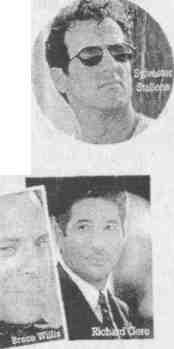 Sylvester
Stallone has got lips with down-turning corners. It means he is
generous.
Sylvester
Stallone has got lips with down-turning corners. It means he is
generous.
B. Talk about your partner s character by reading his/her lips.
C. Practice.
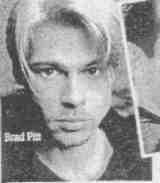
1. Wliich of the following adjectives are positive and which are negative? funny, unreliable, self-confident, caring, imaginative, outgoing, helpful, rude, easy-going, stubborn, cooperative, selfish, shy, disorganised, forgetful, active, lazy, loyal, arrogant, polite
— 21 —
Positive funny,
Negative unreliable,
When you describe people's character, you can include positive (e.g. kind) and negative (e.g. lazy) qualities.
When you talk about negative qualities, you can use the expressions in bold, e.g. He tends to/can be aggressive at times. He is often aggressive. (NOT:
He is aggressive). Look at the ways you can join the sentences.
Similar qualities
e.g. She is friendly. She is polite. She is friendly and (also) polite. She is friendly and polite as well.
Opposing qualities
e.g. He is helpful. He can be arrogant at times. He is helpful but he can be arrogant at times. He is helpful. On the other hand/However, he tends to be arrogant at times.
2. Join the ideas using: and falso/ but, however, on the other hand.
Roger is friendly. Roger is caring.
John is intelligent. John is self-centred.
Andrew is stubborn. Andrew is disorganized.
Paul is cooperative. Paul is forgetful.
Michael is energetic. Michael is bossy.
3. Look at the list of adjectives in Ex. 1 and make sentences about people you know using: and, also, as well, but, however, on the other hand.
3&?" Tom is friendly and caring as well.
4. Fill in the gaps with: early, mid, late.
13 - 14 = in his/her teens
38-39 = in his/her thirties
44 - 46 = in his/her forties
21 - 23 = in his/her twenties
67 - 69 = in his/her sixties
57 - 59 = in his/her fifties
— 22 —
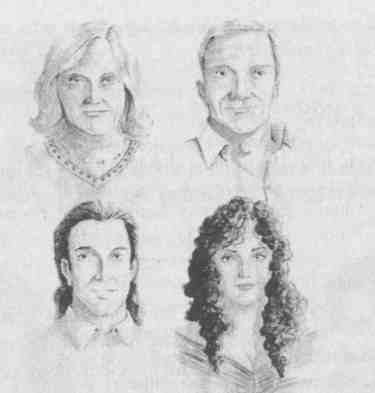
D. Read the following descriptions and match them with the pictures above. Then fill in the table below with words from the paragraphs. Finally, cover the paragraphs and describe each person.
Mary's short and in her early twenties. She's got an oval face, long black curly hair and a small nose. Her eyes are brown.
Paul's tall and in his early thirties. He's got a long face and long black hair. His nose is quite large and he's got a small mouth.
Sally's short and plump. She's in her late sixties. She's got a square face, shoulder-length wavy grey hair and a wide mouth. Her eyes are green.
Mike's tall, well-built and middle-aged with a square face. His mouth is wide, and his nose is rather big. He has large dark brown eyes and short grey hair.
|
Height: |
|
|
Build: |
|
|
Age: |
|
|
Face: |
|
|
Hair: |
|
|
Eyes: |
|
|
Mouth: |
|
|
Nose: |
|
23
E. Write a short paragraph describing your best friend's physical appearance and character.
Famous Faces
Face reading, or personology, is an old art that is becoming more and more popular. It is believed that a person's facial features can tell us a lot about what kind of person they are. Let's see what some famous faces tell us.

Mel Gibson
Mel's square forehead means he is honest and not afraid to say what he thinks. However, the laughter lines around his eyes show he's a very funny person who enjoys listening to and telling jokes.
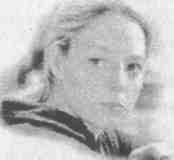
Jodie Foster
Jodie has large eyes, which means she is very creative. She's also got long eyebrows and a small nose, which means she's a friendly person and very gentle, too.
N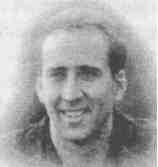 icolas
Cage
icolas
Cage
Nicolas has got a long oval face. That means he's quite active, but he's got full lips, so he is also a calm and relaxed sort of person. His very high forehead and large wide eyes tell us he is also open-hearted and very generous.

Meg Ryan
Meg's well-spaced eyes mean she's probably a very sociable person, and her oval-shaped face and wide thin lips show she's also quite ambitious. However, her small pretty nose suggests she can also be very gentle and kind. She probably loves children and animals.
24 —
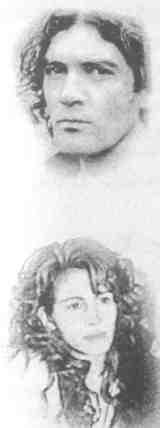
Antonio Banderas
Antonio's strong jawline means he's a very determined kind of person. At the same time, he's probably quite romantic, because he's got a large nose with a soft tip. His high cheekbones are a sign that he loves to travel, likes adventure and change, and gets bored very easily.
Julia Roberts
Julia has a wide mouth and very full lips, which show she has a huge appetite for life and a desire to try everything. Her very long arched eyebrows show she is kind to others as well as being friendly and outgoing.
Unfortunately, her fun-loving nature sometimes stops her from doing important things or from taking people more seriously.
A. Look at the pictures. Who’ s got: —
short fair hair, well-spaced eyes, an oval-shaped face and a wide mouth with thin lips?
long curly brown hair, a wide mouth, full lips and long arched eyebrows?
long fair hair, long eyebrows and a small nose?
short brown hair, a long oval face with full lips and a big nose?
shoulder-length curly brown hair, a strong jawline and high cheekbones?
short dark hair, a square forehead with wrinkles and blue eyes?
B. Read the article and circle the correct answer for questions 1 to 6.
1. Laughter lines around the eyes suggest...
a a good sense of humour.
b honesty.
2.Long eyebrows and a small nose suggest...
a friendliness.
b creativity.
3. A high forehead and large, wide eyes suggest...
a a calm person.
b generosity.
— 25 —
4. Wide, thin lips suggest someone who has got... a a fun-loving nature.
b ambition.
A strong jawline suggests ... a someone who is romantic. b determination.
A wide mouth and very full lips suggest... a a desire to try everything.
b friendliness.
